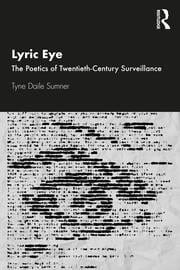
Five minutes with Dr Tyne Sumner, author of Lyric Eye: The Poetics of Twentieth-Century Surveillance
Today we’re sitting down for five minutes with Dr Tyne Sumner to discuss her new book Lyric Eye: The Poetics of Twentieth-Century Surveillance. Tyne is ARC Research Fellow in the School of Culture and Communication and founding member of HADES.
1. Thank you for sharing your thoughts on Lyric Eye today Tyne. What sparked your interest in working at the intersection of poetry and surveillance?
I suppose it started with an interest in confession. I’ve always been drawn to the idea of confession and the ways that confessional discourse is enacted and manifests in different ways: in literature, but also via social media, in film and even in seemingly objective fields like journalism or the sciences. My first proper research project looked at a collection of poetry called Birthday Letters, published in 1998 by the English poet Ted Hughes. Birthday Letters was, in many ways, a literary sensation – not just because of the content of the poems themselves but because of the way the collection claimed to offer a range of so-called confessions about Hughes’ ex-wife, the famous poet Sylvia Plath. It staged its own confessions in a meta-fictional announcement and yet the poems themselves didn’t really reveal any new gossip at all.
After that, I studied the confessional poets who wrote around the 1950s and 1960s in America and eventually I stumbled across a range of poems that addressed the experience of being watched (and to watch). Since so many of these poems expressed an intense anxiety about the collapsing boundary between public and private lives in the second half of the twentieth century, I started to look more closely at the social and cultural (and political) conditions surrounding them. What I found was that many poets – even those who were very reserved about the topic of surveillance – were closely monitored by the FBI. At that point I had arrived at two registers of exploration: a theoretical thread on poetry about surveillance and an empirical thread on surveillance about poets. From there, I developed a methodology to connect the two and that became my PhD topic and, later, Lyric Eye.
2. Your book draws comparisons between styles of information-gathering in poetry and surveillance. Can you talk a little bit more on what poetry can tell us about our relationship with often ubiquitous surveillance systems?
In the book I make the case that poets have been doing the work of close observation, information gathering and a kind of data synthesis longer than anyone (or anything) else. A lot of people seem to think of poetry first and foremost as a sentimental mode of self-disclosure; one primarily concerned with nature or romance (Shall I compare thee to a summer’s day!). But poetry is also about the construction of codes and deliberate manipulation of language. It’s a mode that takes abstract and complex information about the world around us an coheres it (or compresses it) towards an aesthetic outcome. Surveillance studies scholar Gary Marx describes surveillance as the extraction of information from the ‘ubiquitous flow of distinct data points’ and this is ultimately what poetry does. It takes all and every stimuli from the world around us – people, places, sensations, feelings, objects, images – and brings them together to tell a distinctive story.
But most crucially, just like the surveillance matrix, poetry can also deceive and confuse – it can offer a range of angles or accounts from the same piece of information. This is usually what people find most confronting about poetry: its ability to tell multiple stories at the same time. It can require concentrated and complex interpretation, or it can simply just be. Perhaps poetry does this because it takes information from the world and dramatizes it; stages it in a new way. In their canonical 1938 work Understanding Poetry, Cleanth Brooks and Robert Penn Warren claim that every poem is, in some sense, ‘a little drama.’ And surveillance is a bit like that too – a kind of performance of watching, listening, overhearing … it’s dramatic!
3. You draw on a breadth of poets in your book. How did you select these for inclusion? Is there one particular work of poetry you are drawn to and would recommend?
I didn’t really set out with any key poets in mind, except for the obvious candidates who were closely surveilled by the FBI such as Langston Hughes and James Baldwin. I came across lots of fascinating poets who express fleeting interests in surveillance, such as Edna St. Vincent Millay and others who don’t write about surveillance explicitly but whose work is full of metaphors about spying and spies such as W.H. Auden. Other poets were interested in the intrusions into the private sphere of the home during the cold war period, such as Anne Sexton and Sylvia Plath. Probably the poem that I keep coming back to though is William Carlos Williams’ “To Have Done Nothing.” Curiously, it doesn’t invoke surveillance directly but is instead all about the kind of code breaking, code making, and deception that surveillance strategies frequently employ. Using elaborate grammatical constructions, Williams reveals the extent to which acts of interpretation are often just as much about the person doing the interpreting as they are about the data or information being processed: “codes / for everything / and nothing / are synonymous.”
Thank you Tyne for sharing these thoughts! From the team at HADES, congratulations on this fantastic publication.
Described as “ground-breaking and prescient”, this book is a must read for digital humanities folk. Find details at the publisher: https://www.routledge.com/Lyric-Eye-The-Poetics-of-Twentieth-Century-Surveillance/Sumner/p/book/9781032052083
Categories